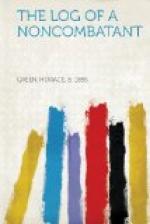Now only one of the churches stood, as well as the building where the officers were quartered, the Museum of Antiquity, and perhaps a dozen others. Across the moat, which led to the gateway of what were formerly the inner fortifications, were piles of rotting horseflesh. The bronze statue of De Smet, the Jesuit missionary, looked calmly on the scene. All the rest was blotted out. There was no sign of hot-tempered impetuous work of a handful of drunken Uhlans, a fire started in anger and driven by the wind throughout the entire town. There was not a breath of wind. That the night was calm was shown by the fact that here and there single houses, even houses built of boards, were spared at the commander’s word. The convent was burnt and pillaged, stones and mortar littered the street in front of the Hotel de Ville, and upon the sidewalk lay the famous bells which came crashing to the street below when shells burst in the belfry. From cellar to garret nearly every remaining house was systematically drenched with naphtha and the torch applied, and when all was over hundreds of gallons were tossed into the River Scheldt. Over a small group of houses in the poorer section of the city, where the prostitutes were quartered, grim Prussian humor, or perhaps a sense of value received, had prompted the conquerors to write in great white chalk marks in German script, “Gute Leute. Nicht brennen!” (Good people. Do not burn!)
For an hour we walked through the silence of ashes and stone, stumbling over timber and debris, tangled and twisted wire, a fallen statue, broken bells or the cross-piece of a spire; we made our way through piles of beds, chairs, singed mattresses, and stepped over the carcass of a horse with its belly bloated and flies feasting on its glassy eyes. We entered an apothecary shop where the clock still ticked upon the counter. Thinking there could be no reason of war to call for the destruction of the orphan asylum, we entered its portals to investigate. Before us lay burnt beds and littered glass. We searched what ten days before had been a convent, and crawled over heaps of logs and brick into narrow alleys that reminded one of Naples or Pompeii—alleys where the walls stood so close as to hide the light of sun but not the odor of charred vats and sewage and smouldering, smelling things, long dead. Not far from there the way widened into the light, and before us, breaking the rays of sunset, stood the cross above a heap of cobblestones.
“They are buried here,” said Verhagen, “and here too is my house.”
Another alderman, a friend of Verhagen, who had been allowed to remain in Termonde most of the four days that the Germans stayed, had the story detailed in his little pocket diary. On Thursday, September 3, he said, he was just leaving his rope and twine factory when he heard the sounds of musketry to the south. A small force of Belgian outposts were completely surprised by a part of the Ninth German Army Corps under General von Boehn. They were completely outclassed. Before retreating, however, they let the enemy have a couple of volleys. In the return fire they lost six of their men. They then retreated into the town and across the bridge.




